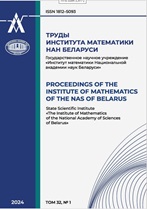|
|
Proceedings of the Institute of Mathematics of the NAS of Belarus, 2024, Volume 32, Number 1, Pages 31–37
(Mi timb381)
|
 |
|
 |
ALGEBRA AND NUMBER THEORY
On $n$-multiply $\sigma$-locality of a non-empty $\tau$-cloused formation of finite groups
I. N. Safonova
Belarusian State University, Minsk, Belarus
Abstract:
All groups under consideration are finite. Let $\sigma =\{\sigma_{i} \mid i\in I \}$ be some partition of the set of all primes, $G$ be a group, $\sigma (G)=\{\sigma_i\mid \sigma_i\cap \pi (G)\ne \varnothing\} $, $\mathfrak F$ be a class of groups, and $\sigma
(\mathfrak{F})=\bigcup\limits_{G\in \mathfrak{F}}\sigma (G).$
A function $f$ of the form
$f:\sigma \to\{\text{formations of groups}\}$ is called
a formation $\sigma$-function. For any formation $\sigma$-function $f$ the class $LF_{\sigma}(f)$ is defined as follows:
$
LF_{\sigma}(f)=(G \mid G=1 \ \text{or }\ G\ne 1\ \text{and }G/O_{\sigma_i', \sigma_i}(G) \in f(\sigma_{i}) \ \text{ for all } \sigma_i \in \sigma(G)).
$
If for some formation $\sigma$-function $f$ we have $\mathfrak{F}=LF_{\sigma}(f),$ then the class $\mathfrak{F}$ is called $\sigma $-local and $f$ is called a $\sigma$-local definition of $ \mathfrak{F}.$
Every formation is called $0$-multiply $\sigma $-local. For $n \geqslant 1,$ a formation $\mathfrak{F}$ is called $n$-multiply $\sigma $-local provided either $\mathfrak{F}=(1)$ is the class of all identity groups
or $\mathfrak{F}=LF_{\sigma}(f),$ where $f(\sigma_i)$ is $(n-1)$-multiply $\sigma$-local for all $\sigma_i\in \sigma (\mathfrak{F}).$
Let $\tau(G)$ be a set of subgroups of $G$ such that
$G\in \tau(G).$ Then $\tau$ is called a {subgroup functor} if for every epimorphism $\varphi$ : $A \to~B$ and any groups $H \in \tau (A)$ and $T\in \tau (B)$ we have $H^{\varphi}\in\tau(B)$ and $T^{{\varphi}^{-1}}\in\tau(A).$
A class of groups $\mathfrak{F}$ is called
{$\tau$-closed} if $\tau(G)\subseteq\mathfrak{F}$ for all $G\in\mathfrak F.$
In this paper, necessary and sufficient conditions for $n$-multiply $\sigma$-locality $(n\geqslant 1)$ of a non-empty $\tau$-closed formation are obtained.
Keywords:
finite group, formations, subgroup functor, $\sigma$-local formation, $\tau$-closed formation.
Received: 21.02.2024
Revised: 14.06.2024
Accepted: 18.06.2024
Citation:
I. N. Safonova, “On $n$-multiply $\sigma$-locality of a non-empty $\tau$-cloused formation of finite groups”, Proceedings of the Institute of Mathematics of the NAS of Belarus, 32:1 (2024), 31–37
Linking options:
https://www.mathnet.ru/eng/timb381 https://www.mathnet.ru/eng/timb/v32/i1/p31
|

| Statistics & downloads: |
| Abstract page: | 20 | | Full-text PDF : | 3 | | References: | 18 |
|




 Contact us:
Contact us: Terms of Use
Terms of Use
 Registration to the website
Registration to the website Logotypes
Logotypes








 Citation in format
Citation in format 